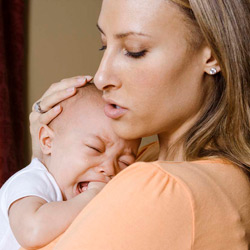Understanding Why Babies Cry
By Jennifer Hor,
Midwife and International Certified Trainer and Therapist,
Jenlia Maternity Services; Parenting Educator, Co Author of Asian Parenting Today
Everyone knows that babies cry. However, a baby’s cries can cause anxiety, stress, frustration, anger, a sense of guilt or a lack of confidence especially for new parents who may feel that they lack proper parenting skills or the understanding to meet the needs of their child.
Should babies cry?
At birth, a baby’s cry is always a relief as it indicates that the baby is normal and healthy. Parents wait impatiently to hear their baby’s first cry. Nevertheless, subsequent bouts of crying are often a stressful and worrying experience for many parents.
In spite of this however, a baby’s cries should generally be viewed as a good thing. Firstly, it indicates that the baby has a good pair of lungs. Secondly, it tells us that the baby is trying to communicate. How else is he going tell you that he is hungry or bored?
Why do babies cry?
Babies cry for many reasons. These include :
- Hunger
- Tired
- Sleepy
- Bored
- Uncomfortable
- Frustrated
- Overstimulated
- Trapped gas in tummy
- Colic
- Stranger anxiety
When do babies cry?
Sometimes a baby’s cries seem endless. This is especially so in the middle of the night or when the parents are tired or in the evening when the baby is tired.
A newborn born baby doesn’t cry much until about the age of around two weeks old. From then, the crying will peak between four to six weeks and will gradually reduce and stabilise by the time the baby is three to four months old. Babies usually become more wakeful from about two weeks old and as they become more wakeful and alert, they need stimulation and can be easily ‘bored’. Just as a baby in need of attention will cry so will an overstimulated baby. The balance between stimulation and overstimulation is very delicate and both parents and baby need to work together to recognise the signals.
An overstimulated or overly tired baby will cry in frustration. This crying or wailing as most parents noticed can be very unnerving. The baby may appear to cry for hours and finally, when exhausted, will fall asleep. Most parents cannot understand why a tired baby cannot just fall asleep. The fact is most young babies need assistance to soothe them till they fall asleep. A young overstimulated baby is simply unable to self soothe so he needs assistance to unwind to be able to fall and stay asleep.
Colic also tends to set in at about this time, which further complicates the picture. Although there is no definite consensus as to what is colic, it is thought to be a combination of accumulated gas trapped in the baby’s immature digestive system causing discomfort and spasms. In addition, the infant may be upset due to improper feeding and lack of proper sleep caused by the discomfort.
By the age of three to four months, the baby’s digestive system will stabilise and he is able to better soothe and calm himself by finding his fingers and by being more aware of his environment. As he grows, he will communicate better by using facial expressions such as smiles and laughter and later on with gestures and finally words.
How do you cope with a crying baby?
When a newborn baby cries, parents automatically tend to think that the baby is hungry or having colic. When a baby does not stop crying, frustration, anger and panic may set in. It is necessary to reflect on one’s response to a crying baby when planning on how to manage and cope with the situation.
Stay Calm
Staying calm at all times is the mantra when handling crying babies. Whether he is hungry, tired, sleepy, frustrated or uncomfortable, you cannot think clearly and act appropriately unless you are calm. Once having identified the cause you will be able to attend to your baby more confidently.
Responding and handling your baby with confidence gives him a sense of security. He will be more relaxed and happier too.
Attend to the Baby
When your baby cries, do attend to him as soon as possible. If you cannot physically attend to your child, do keep talking to your baby in a calm soothing voice. He will soon learn that there is nothing to panic about and eventually he will realise that there is no need to scream if he needs mummy or daddy.
Feed the Baby
Feeding your baby before he is frantic with hunger and on demand will reduce crying. A hungry baby is not a happy baby.
Assist the Baby
If your child is tired or overstimulated and is unable to settle to sleep, do assist him to unwind and fall asleep. Do not worry about ‘bad’ habits. It is more important that the baby gets good sleep than learning when he is young. Having a consistent sleep technique, a regular bedtime and understanding your baby’s sleep signals will reduce unnecessary crying and the creation of long term ‘bad habits.
Soothing the Baby
Understanding what helps to sooth and calm your baby will reduce the duration and frequency of his cries. Techniques such as swaddling, swaying, carrying upright with tummy against shoulder, ‘white’ noise and allowing your baby to suck if needed have been found to be helpful.
Establish a Routine
Babies and young children like predictability. Having a regular routine will assist both parents and baby to know how the day is planned out and what to expect. A workable routine is one that is suitable for both baby and parents.
When should you seek help?
If your baby cries to a point of being inconsolable even after you have tried to eliminate all the possible causes or if the cries are different from his usual crying or if you find that you are very anxious each time your baby cries, it is time to seek medical help.









